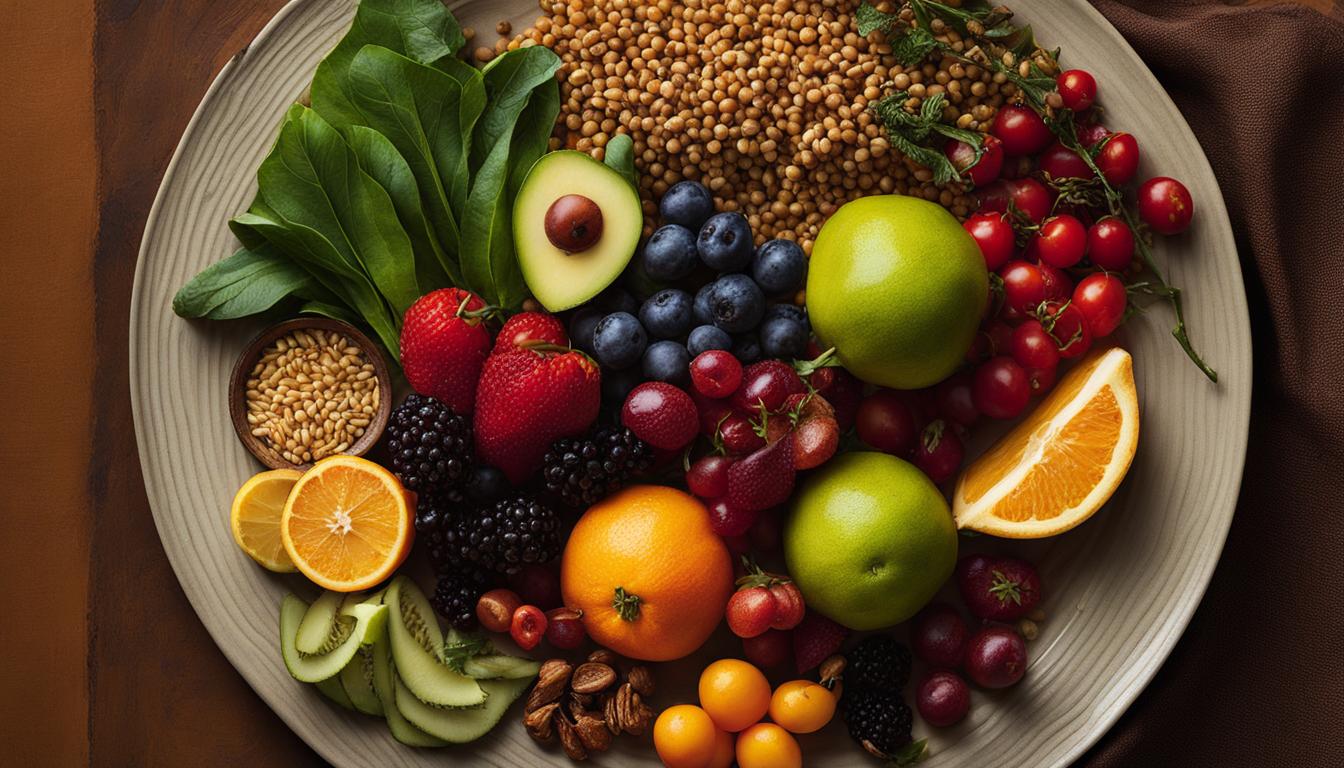Welcome to our article on the Valencia Diet, a plant-based eating plan that can transform your approach to healthy eating. Developed by renowned nutritionist Dr. Elmer Valencia, this nutrition plan offers a flexible and personalized approach to achieving your health goals. Whether you’re looking to lose weight, improve your energy levels, or enhance your overall well-being, the Valencia Diet can be tailored to meet your needs.
At its core, the Valencia Diet emphasizes the consumption of whole, unprocessed foods, with a focus on fruits, vegetables, whole grains, legumes, nuts, and seeds. By incorporating these nutrient-rich foods into your meals, you’ll nourish your body with vitamins, minerals, and antioxidants, while reducing your intake of animal products and processed foods.
The Valencia Diet goes beyond just weight loss — it’s a comprehensive program that aims to enhance your long-term wellness. By adopting this Mediterranean-inspired eating plan, you’ll not only experience improvements in your physical health but also in your sleep, mood, and overall quality of life.
Key Takeaways:
- The Valencia Diet is a plant-based eating plan developed by Dr. Elmer Valencia.
- It promotes the consumption of whole, unprocessed foods, such as fruits, vegetables, whole grains, legumes, nuts, and seeds.
- The diet can be personalized to meet individual health goals, preferences, and medical conditions.
- Benefits of the Valencia Diet include weight loss, improved energy levels, better sleep, and enhanced overall health.
- The Valencia Diet follows the principles of Mediterranean eating, known for its long-term health benefits.
What is the Valencia Diet?
The Valencia Diet is a plant-based eating plan that focuses on consuming whole, unprocessed foods. It emphasizes the consumption of fruits, vegetables, whole grains, legumes, nuts, and seeds, while limiting animal products and processed foods. This diet is tailored to each individual based on factors such as health goals, lifestyle, food preferences, culture, and medical conditions. The Valencia Diet promotes balanced nutrition and encourages a positive relationship with food. With its flexibility, this diet can be adapted to different health conditions and needs.
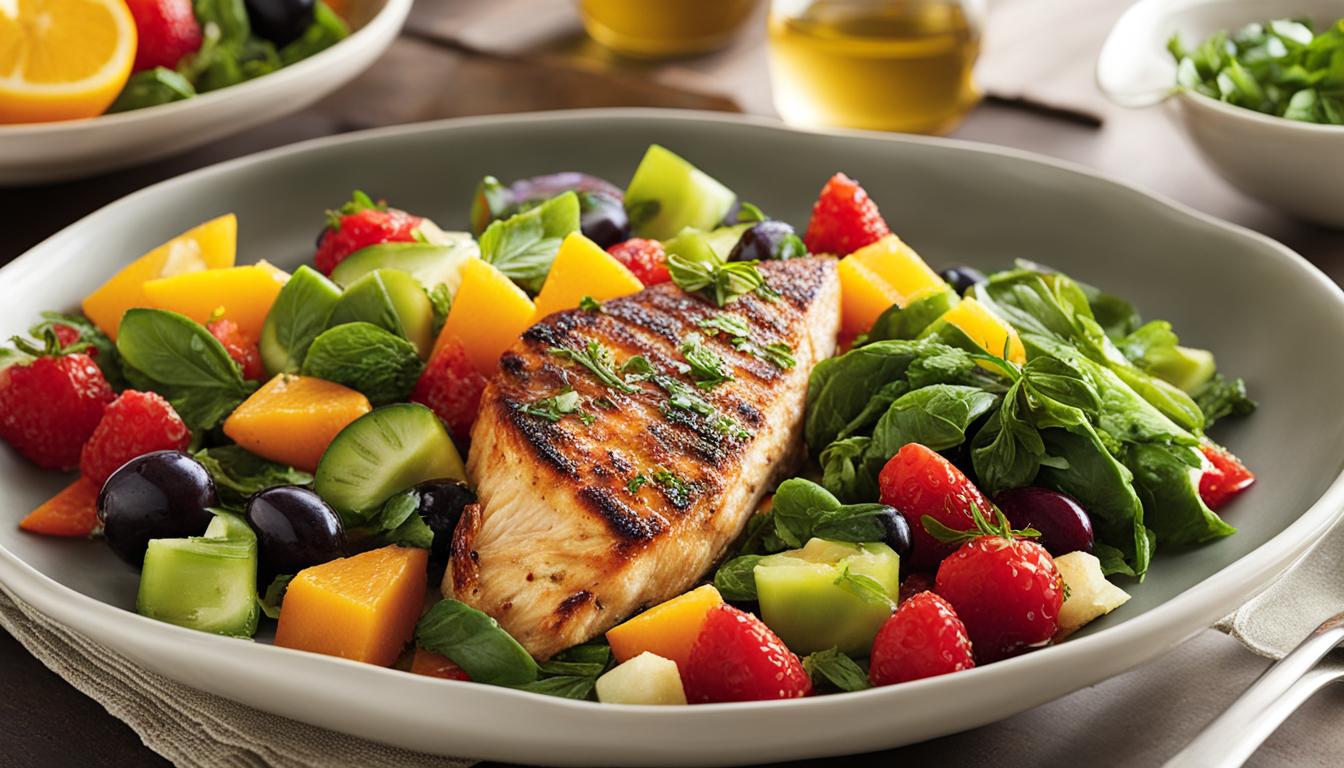
Key Components of the Valencia Diet
The Valencia Diet focuses on key components that contribute to a healthy eating plan. By incorporating these components into your daily routine, you can experience the benefits of balanced nutrition, mindful eating, and improved overall health.
The Power of Plant-Based Foods
Plant-based foods form the foundation of the Valencia Diet. By consuming abundant fruits, vegetables, whole grains, legumes, nuts, and seeds, you can fuel your body with essential vitamins, minerals, and antioxidants. These nutrient-dense foods nourish your body, support optimal health, and provide a wide range of health benefits.
“The Valencia Diet encourages individuals to prioritize plant-based foods, which are rich in fiber, antioxidants, and phytochemicals. These nutrients help reduce the risk of chronic diseases and promote overall well-being.”
Limiting Animal Products and Processed Foods
The Valencia Diet recommends limiting the consumption of animal products such as meat, fish, and eggs. By reducing animal product intake, you can lower your saturated fat and cholesterol levels, while increasing your intake of plant-based proteins and healthy fats.
Processed foods, which are often high in sugar, fat, and sodium, should also be minimized. These foods lack the essential nutrients found in whole, unprocessed foods and can contribute to health issues such as weight gain, high blood pressure, and inflammation.
Hydration and Mindful Eating
Adequate hydration is emphasized in the Valencia Diet. Staying hydrated supports proper digestion, nutrient absorption, and overall bodily functions. It is recommended to drink plenty of water throughout the day to maintain hydration.
In addition to hydration, practicing mindful eating is a key aspect of the Valencia Diet. Mindful eating involves paying attention to your body’s hunger and fullness cues, eating slowly, and savoring each bite. By practicing mindful eating, you can develop a healthier relationship with food, prevent overeating, and truly enjoy the dining experience.
Portion Control for Balanced Nutrition
Portion control plays a vital role in the Valencia Diet. By being mindful of your portion sizes, you can ensure that you consume the right amount of nutrients your body needs without overindulging. Portion control helps maintain a healthy weight, prevents overeating, and promotes balanced nutrition.
The Valencia Diet emphasizes the importance of eating a variety of foods in appropriate portion sizes to achieve a well-rounded and balanced diet.

By incorporating these key components into your eating plan, you can experience the many benefits of the Valencia Diet, including improved overall health, weight management, increased energy levels, and enhanced well-being.
Dr. Valencia Diet Meal Plan
Although there is no official meal plan for the Valencia Diet, there are several meal suggestions that align with its guidelines. This plant-based diet places a strong emphasis on consuming whole, unprocessed foods. By incorporating a variety of fruits, vegetables, whole grains, legumes, nuts, and seeds, individuals can create nutritious and satisfying meals.
Here are some examples of meals that fit within the Valencia Diet:
- Vegetable Curry: A flavorful blend of fresh vegetables, spices, and plant-based proteins like tofu or chickpeas, served over a bed of brown rice or quinoa.
- Mediterranean Flatbread: A delicious combination of whole wheat flatbread, creamy hummus, and an assortment of colorful, sliced vegetables.
- Grilled Salmon with Roasted Vegetables: A nutritious and satisfying meal that features grilled salmon alongside a colorful assortment of roasted vegetables, such as bell peppers, zucchini, and sweet potatoes.
- Chicken Stir-Fry with Brown Rice: A flavorful stir-fry dish made with lean chicken, a variety of colorful vegetables, and served with wholesome brown rice.
- Quinoa and Vegetable Bowl: A nourishing bowl that combines protein-rich quinoa with an assortment of fresh vegetables, such as roasted butternut squash, leafy greens, and avocado.
These meal suggestions are just a starting point, as the Valencia Diet allows for personalization based on individual preferences and needs. Feel free to experiment with different flavors, ingredients, and cooking techniques to create delicious and satisfying meals that align with the Valencia Diet’s principles.
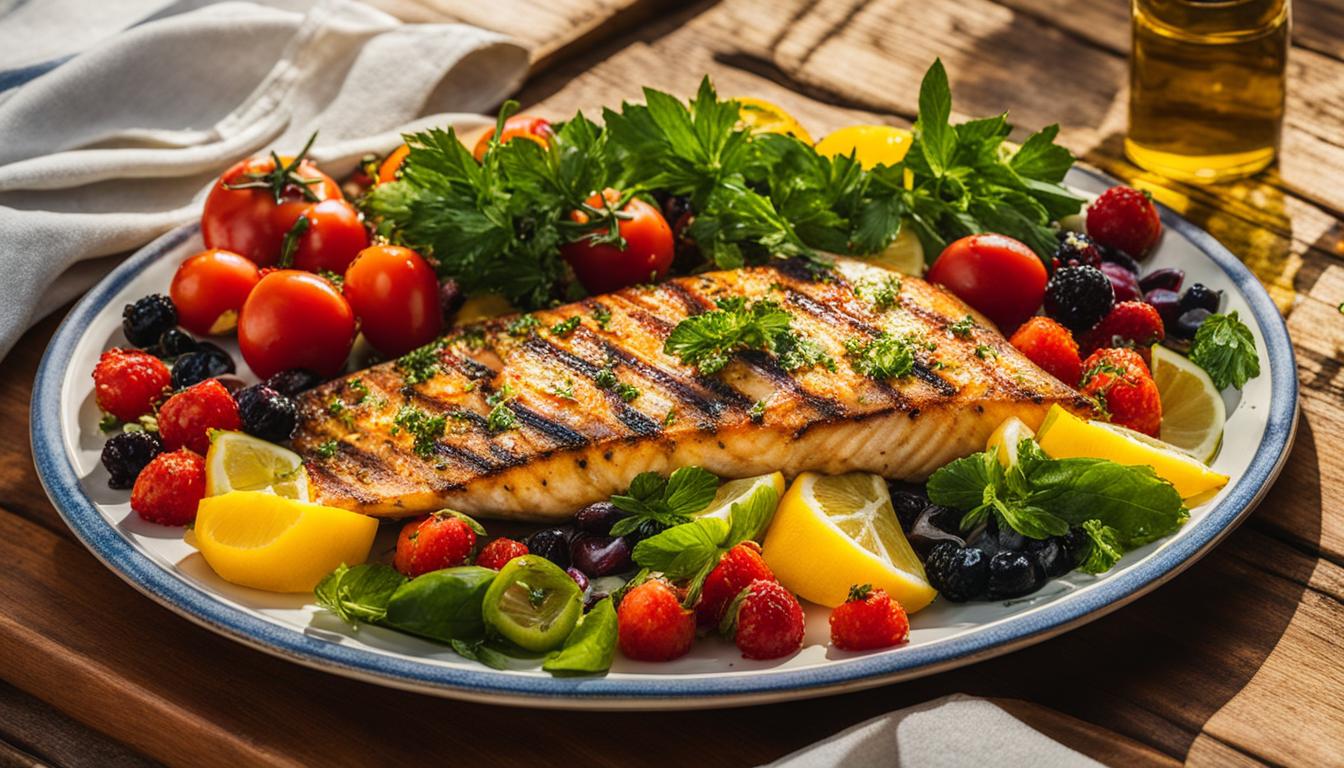
Remember, the key to success on the Valencia Diet is to prioritize whole, unprocessed foods and tailor your meal plan to your individual needs. By incorporating these nutrient-dense foods into your daily meals, you can enjoy a plant-based diet that supports your health and wellness goals.
Benefits of the Valencia Diet
The Valencia Diet offers numerous benefits for overall health and well-being. By emphasizing wholesome nutrition and balanced eating habits, it promotes long-term wellness. For those looking to lose weight, the Valencia Diet can be helpful as it limits processed foods and overeating. Following this diet, many people have reported improvements in energy levels, sleep quality, mood, and overall health.
One individual who followed the Valencia Diet said,
“I feel more energetic and focused throughout the day. The weight loss has been a bonus, but the biggest change I’ve noticed is my improved sleep. I wake up feeling refreshed and ready to take on the day!”
The Valencia Diet is designed to be easy to follow and can be adapted to accommodate different health conditions and dietary needs. Whether you’re looking to improve your overall well-being or manage specific health conditions, the Valencia Diet offers a flexible and effective approach to achieving your goals.

Introduction to the Valencia Diet
The Valencia Diet is an eating plan that focuses on consuming whole, unprocessed foods. By prioritizing the consumption of fruits, vegetables, whole grains, legumes, nuts, and seeds, the Valencia Diet offers a plant-based approach to nutrition. This dietary approach ensures the inclusion of essential vitamins, minerals, and antioxidants, which are abundant in these unprocessed foods.
“Eating unprocessed foods is key to supporting overall health and well-being. The Valencia Diet emphasizes the importance of consuming foods in their natural form, allowing individuals to reap the numerous benefits of their nutritional content.”
By following the Valencia Diet, individuals can fuel their bodies with the necessary nutrients while enjoying a wide range of delicious and wholesome foods. Adopting a plant-based approach can provide ample vitamins, minerals, and antioxidants, which are essential for optimal health.
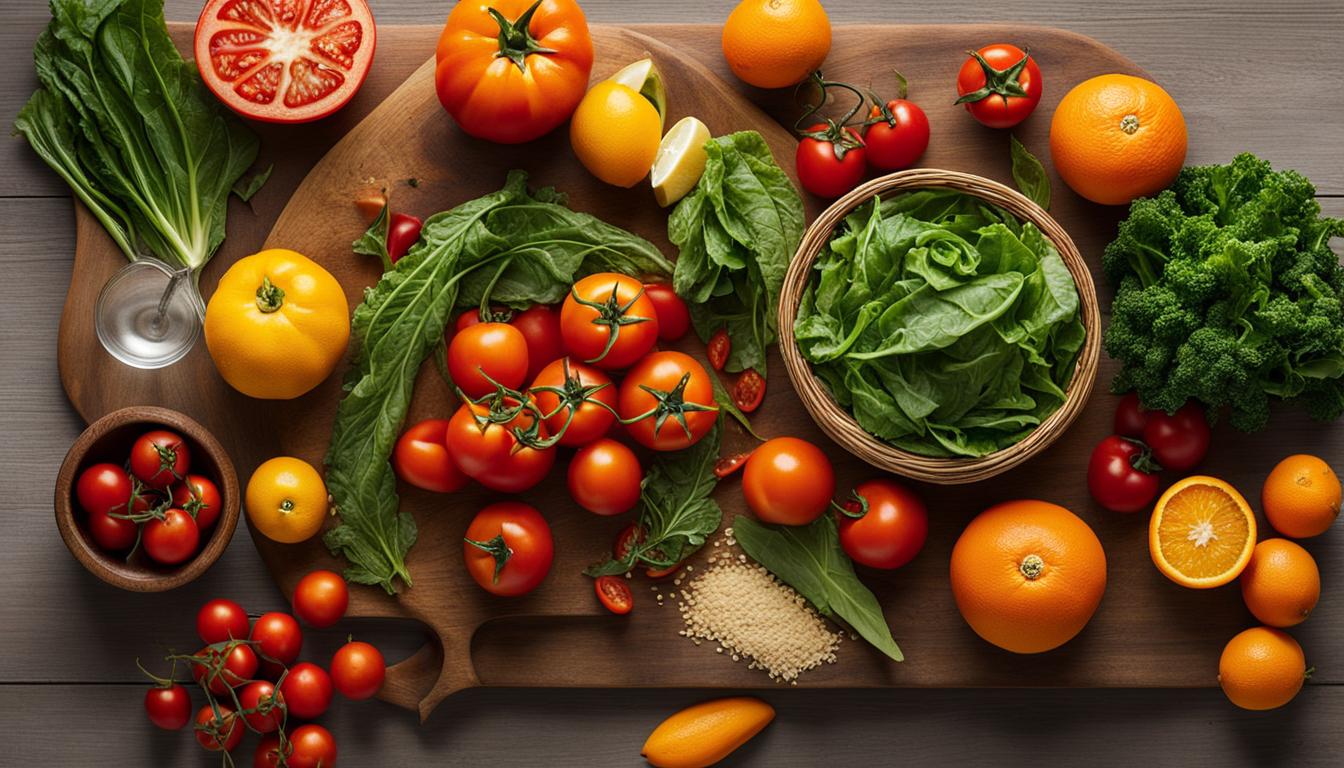
The Valencia Diet is suitable for individuals of all ages and health conditions; however, it is always recommended to consult with a healthcare provider before making significant changes to your diet. They can provide personalized guidance and ensure that the Valencia Diet aligns with your specific needs and requirements.
Key Components of the Valencia Diet
The Valencia Diet incorporates a variety of key components to promote a balanced and nourishing eating plan. By including these components in your diet, you can reap the benefits of the Valencia Diet and enjoy a healthier lifestyle.
Fruits and Vegetables
A cornerstone of the Valencia Diet is the consumption of a wide variety of fruits and vegetables. From leafy greens to brightly colored vegetables, the diet encourages the inclusion of nutrient-rich produce to ensure you’re getting a range of vitamins, minerals, and antioxidants.
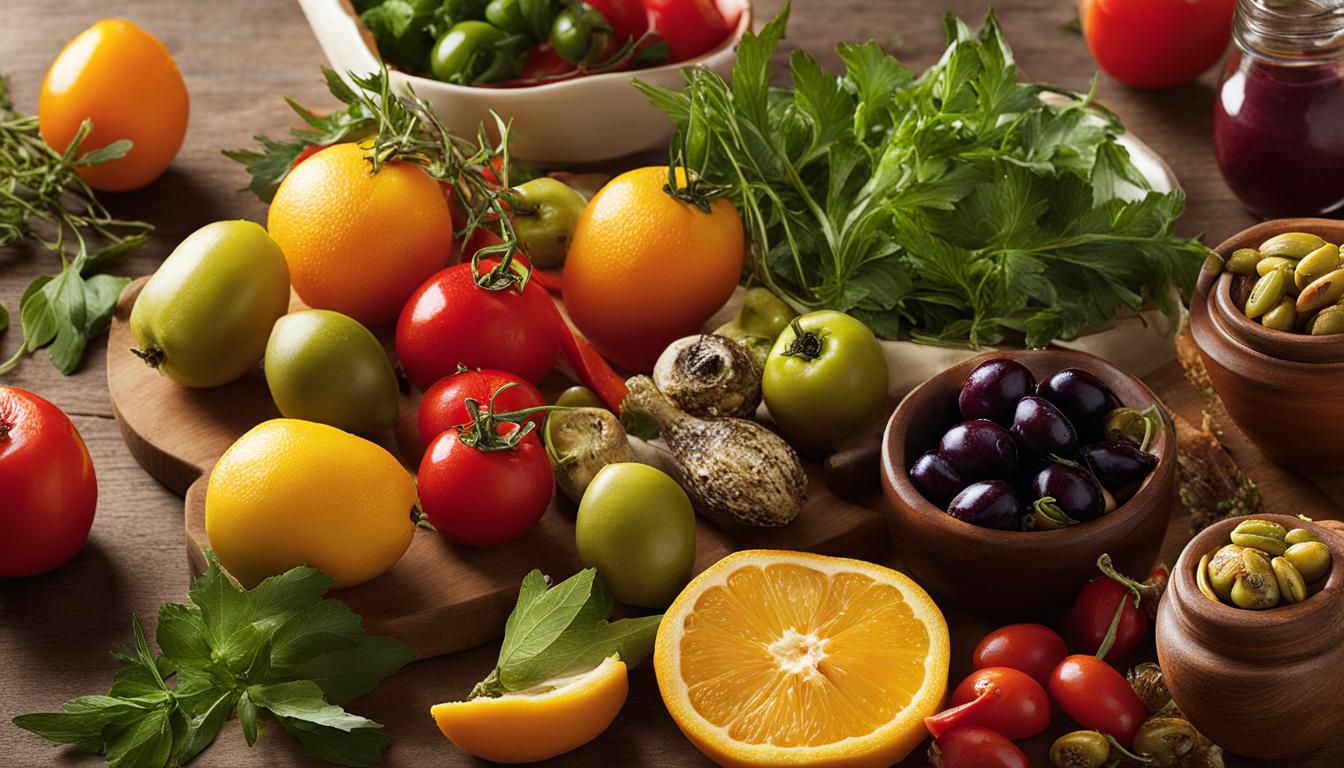
Seafood
Incorporating seafood into your diet is another important aspect of the Valencia Diet. Seafood offers essential omega-3 fatty acids, lean protein, and various vitamins and minerals. Make it a point to enjoy seafood at least twice a week, including options like fatty fish, shellfish, and white fish.
Nuts and Wine
Moderation is key when it comes to nuts and wine on the Valencia Diet. Nuts provide a healthy dose of unsaturated fats, fiber, and essential nutrients. Enjoy them as a snack or incorporate them into your meals for added flavor and texture. Wine, when consumed in moderation, can also be a part of the Valencia Diet, providing antioxidants and potential cardiovascular benefits.
Rice Dishes and Desserts
The Valencia Diet recognizes the enjoyment of rice dishes and desserts. Rice dishes like paella, made with whole, unprocessed ingredients, can be included in your meals. Additionally, desserts made with natural sweeteners and nutrient-dense ingredients can be enjoyed as a treat while still adhering to the guidelines of the Valencia Diet.
By incorporating these key components into your eating plan, you can follow the Valencia Diet and reap its numerous health benefits. The Valencia Diet is not only delicious but also provides a nourishing and balanced approach to eating.
Dr. Valencia Diet Meal Plan
While the Valencia Diet doesn’t have a specific meal plan, there are plenty of delicious and nutritious meal ideas that align with its guidelines. Whether you’re looking for breakfast inspiration, diabetic-friendly options, or dinner ideas, the Valencia Diet offers a variety of tasty choices to suit your needs.
Breakfast Ideas
Start your day off right with a wholesome and satisfying breakfast that fuels your body with the nutrients it needs. Here are a few breakfast ideas that are perfect for the Valencia Diet:
“Oatmeal with nuts and fruit”
“Greek yogurt with berries and granola”
“Veggie omelet with whole-grain toast”
These breakfast options provide a good balance of carbohydrates, protein, and healthy fats to keep you energized throughout the morning while adhering to the principles of the Valencia Diet.
Diabetic-Friendly Options
The Valencia Diet can be especially beneficial for individuals with diabetes, as it promotes the consumption of whole, unprocessed foods and limits added sugars and refined carbohydrates. Here are some diabetic-friendly meal ideas:
“Grilled salmon with roasted vegetables”
“Chicken stir-fry with brown rice”
“Quinoa and vegetable bowl”
These dinner options are low in added sugars and refined carbs, making them suitable for individuals with diabetes or those looking to manage their blood sugar levels.
Results may vary.
The results of following the Valencia Diet can vary from person to person, depending on individual factors such as age, gender, and physical activity level. However, by incorporating these meal ideas into your diet and maintaining a balanced and mindful approach to eating, you can experience the potential benefits of the Valencia Diet, including improved health and overall well-being.
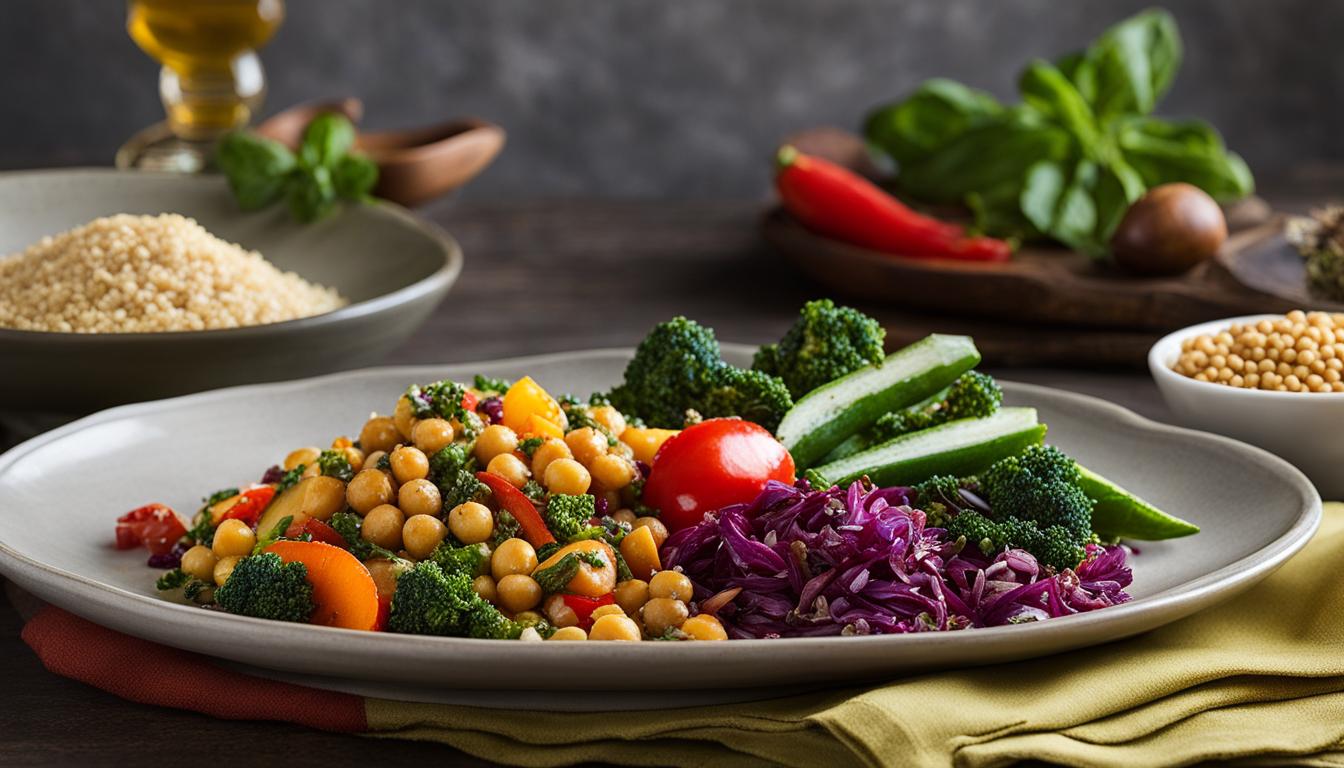
Conclusion
The Valencia Diet offers a flexible and individualized approach to eating that promotes overall health and wellness. By focusing on whole, unprocessed foods and incorporating balanced nutrition and mindful eating habits, individuals can achieve their health goals and improve their overall well-being.
The Valencia Diet embraces the principles of Mediterranean eating, which is known for its health benefits. By following the Valencia Diet, individuals can adopt a healthy and sustainable lifestyle while enjoying the delicious flavors of the Mediterranean.
With its emphasis on plant-based foods, minimal animal products, and avoidance of processed foods, the Valencia Diet provides a framework for individuals to make long-term positive changes to their diet and lifestyle. It not only supports weight loss and improved physical health but also enhances mental well-being and energy levels.
By incorporating the Valencia Diet into their lifestyle, individuals can experience the benefits of Mediterranean eating, such as reduced risk of heart disease, lower cholesterol levels, improved digestion, and increased longevity. The Valencia Diet is more than just a diet; it is a holistic approach to health, wellness, and a fulfilling lifestyle.
FAQ
What is the Valencia Diet?
The Valencia Diet is a plant-based eating plan that focuses on consuming whole, unprocessed foods. It emphasizes the consumption of fruits, vegetables, whole grains, legumes, nuts, and seeds, while limiting animal products and processed foods. The diet is tailored to each individual based on factors like health goals, lifestyle, food preferences, culture, and medical conditions. It promotes balanced nutrition and encourages a positive relationship with food.
What are the key components of the Valencia Diet?
The key components of the Valencia Diet include the consumption of abundant plant foods such as fruits, vegetables, whole grains, legumes, nuts, and seeds. Animal products like meat, fish, and eggs are limited, and processed foods that are high in sugar, fat, and sodium are minimized. Adequate hydration is emphasized, and mindful eating practices, such as listening to hunger and fullness cues, are encouraged. Portion control is also important to avoid overeating. The Valencia Diet ensures balanced nutrition and can be personalized based on individual factors such as health status and food preferences.
Is there a meal plan for the Valencia Diet?
While there is no official meal plan for the Valencia Diet available, there are some meal suggestions that align with its guidelines. The diet primarily focuses on whole, unprocessed foods such as fruits, vegetables, whole grains, legumes, nuts, and seeds. Examples of meals that fit within the Valencia Diet include vegetable curry, Mediterranean flatbread with hummus and vegetables, grilled salmon with roasted vegetables, chicken stir-fry with brown rice, and a quinoa and vegetable bowl. The Valencia Diet is flexible and allows for customization based on individual preferences and needs.
What are the benefits of the Valencia Diet?
The Valencia Diet offers numerous benefits for overall health and well-being. It promotes long-term wellness by emphasizing wholesome nutrition and balanced eating habits. The diet can also aid in weight loss for some individuals by limiting processed foods and overeating. Many people who follow the Valencia Diet report improved energy levels, better sleep, enhanced mood, and overall improvements in their health. The diet is easy to follow and can be adapted for different health conditions and needs.
What is included in the Valencia Diet?
The Valencia Diet is an eating plan that focuses on consuming whole, unprocessed foods. It emphasizes the consumption of fruits, vegetables, whole grains, legumes, nuts, and seeds. By prioritizing these foods, the Valencia Diet ensures a wide range of essential vitamins, minerals, and antioxidants are included in the diet. The Valencia Diet is suitable for people of all ages and health conditions, but it’s important to consult with a healthcare provider before making significant changes to your diet.
What are the key components of the Valencia Diet?
The key components of the Valencia Diet include consuming a variety of fruits and vegetables, incorporating seafood at least twice a week, enjoying nuts and wine in moderation, and including rice dishes and desserts as part of the overall diet. The Valencia Diet recommends a wide range of fruits and vegetables, including leafy greens, cruciferous vegetables, brightly colored vegetables, berries, and citrus fruits. Seafood options like fatty fish, shellfish, and white fish are encouraged. Nuts and wine can be enjoyed as snacks or additions to meals. Rice dishes such as paella and desserts made with whole, unprocessed ingredients can also be included in the diet.
Is there a meal plan for the Valencia Diet?
While there is no official meal plan for the Valencia Diet available, there are some meal ideas that align with its guidelines. For breakfast, options like oatmeal with nuts and fruit, Greek yogurt with berries and granola, and a veggie omelet with whole-grain toast are suitable. The Valencia Diet can also be beneficial for diabetics, as it emphasizes whole, unprocessed foods and limits added sugars and refined carbohydrates. For dinner, options like grilled salmon with roasted vegetables, chicken stir-fry with brown rice, and a quinoa and vegetable bowl are recommended. The results of following the Valencia Diet can vary depending on individual factors such as age, gender, and physical activity level.
What are the benefits of the Valencia Diet?
The Valencia Diet offers a flexible and individualized approach to eating that promotes overall health and wellness. By focusing on whole, unprocessed foods and incorporating balanced nutrition and mindful eating habits, individuals can achieve their health goals and improve their overall well-being. The Valencia Diet embraces the principles of Mediterranean eating, which is known for its health benefits. By following the Valencia Diet, individuals can adopt a healthy and sustainable lifestyle while enjoying the delicious flavors of the Mediterranean.

